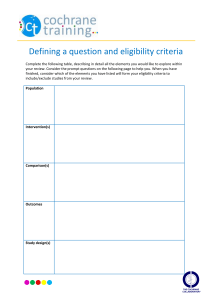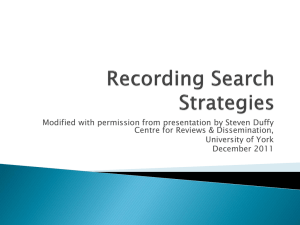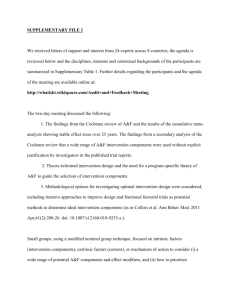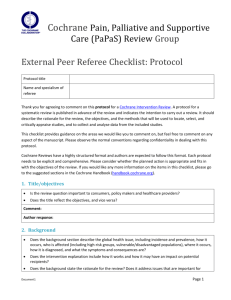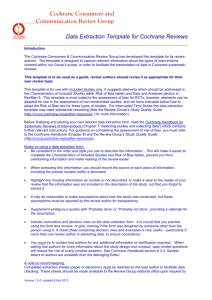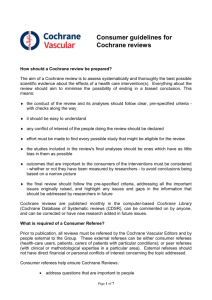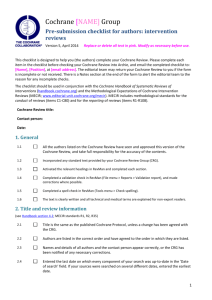Study Selection & Data Extraction Form
advertisement
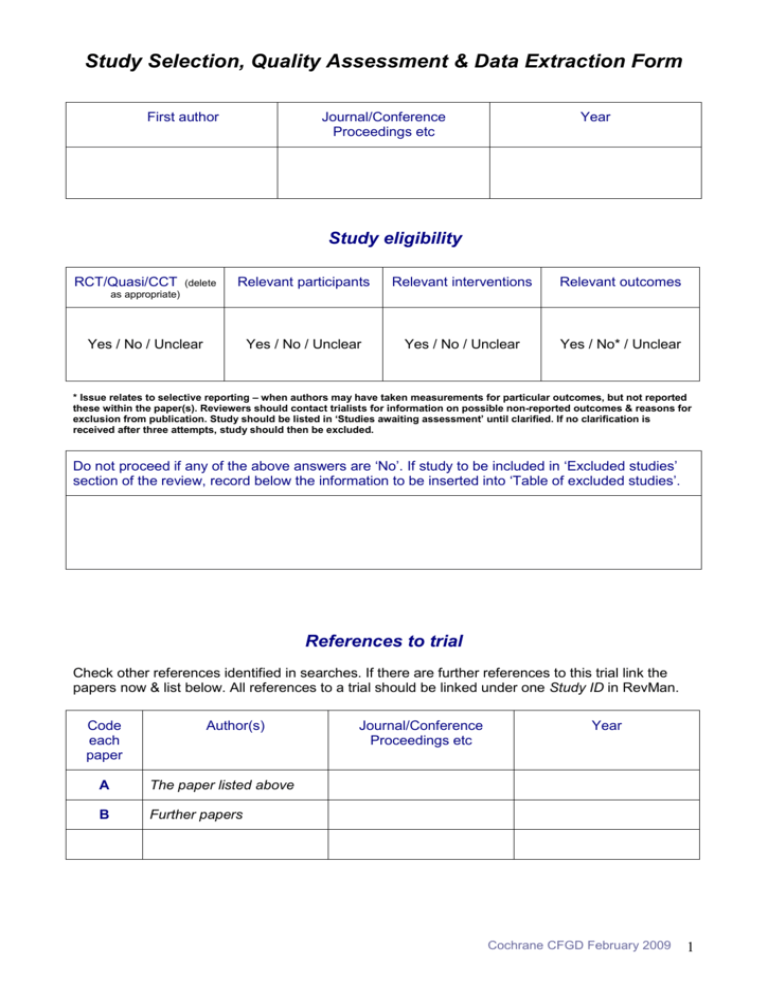
Study Selection, Quality Assessment & Data Extraction Form First author Journal/Conference Proceedings etc Year Study eligibility RCT/Quasi/CCT (delete Relevant participants Relevant interventions Relevant outcomes Yes / No / Unclear Yes / No / Unclear Yes / No* / Unclear as appropriate) Yes / No / Unclear * Issue relates to selective reporting – when authors may have taken measurements for particular outcomes, but not reported these within the paper(s). Reviewers should contact trialists for information on possible non-reported outcomes & reasons for exclusion from publication. Study should be listed in ‘Studies awaiting assessment’ until clarified. If no clarification is received after three attempts, study should then be excluded. Do not proceed if any of the above answers are ‘No’. If study to be included in ‘Excluded studies’ section of the review, record below the information to be inserted into ‘Table of excluded studies’. References to trial Check other references identified in searches. If there are further references to this trial link the papers now & list below. All references to a trial should be linked under one Study ID in RevMan. Code each paper Author(s) A The paper listed above B Further papers Journal/Conference Proceedings etc Year Cochrane CFGD February 2009 1 Participants and trial characteristics Participant characteristics Further details Age (mean, median, range, etc) Sex of participants (numbers / %, etc) Disease status / type, etc (if applicable) Other Trial characteristics see Appendix 1, usually just completed by one reviewer Risk of bias We recommend you refer to and use the method described in the Cochrane Reviewers’ Handbook, Version 5.1* Allocation of intervention State here method used to generate allocation and reasons for grading Risk of bias (circle) Low (Random) High (e.g. alternate) Unclear Concealment of allocation Process used to prevent foreknowledge of group assignment in a RCT, which should be seen as distinct from blinding State here method used to conceal allocation and reasons for grading Risk of bias (circle) Low High Unclear Blinding Person responsible for participants care Yes / No Participant Yes / No Outcome assessor Yes / No Other (please specify) Yes / No Cochrane CFGD February 2009 2 Intention-to-treat An intention-to-treat analysis is one in which all the participants in a trial are analysed according to the intervention to which they were allocated, whether they received it or not. All participants entering trial 15% or fewer excluded More than 15% excluded Not analysed as ‘intention-to-treat’ Unclear Were withdrawals described? Yes No not clear Discuss if appropriate………………………………………………………………………………………… ………………………………………………………………………………………………………… Selective outcome reporting Have you been able to access the trial protocol? Are all outcomes listed in protocol reported in the full trial paper? Data extraction Outcomes relevant to your review Copy and paste from ‘Types of outcome measures’ Reported in paper (circle) Outcome 1 Yes / No Outcome 2 Yes / No Outcome 3 Yes / No Outcome 4 Yes / No Outcome 5 Yes / No Outcome 6 Yes / No Outcome 7 Yes / No Outcome 8 Yes / No Cochrane CFGD February 2009 3 For Continuous data Code of paper A etc Outcomes (rename) Unit of measurement Intervention group n Mean (SD) Control group n Details if outcome only described in text Mean (SD) Outcome A Outcome B Outcome C Outcome D Outcome E Outcome F Cochrane CFGD February 2009 4 For Dichotomous data Code of paper A Outcomes (rename) Intervention group (n) Control group (n) n = number of participants, not number of events n = number of participants, not number of events Outcome G Outcome H Outcome I Outcome J Outcome K Outcome L Other information which you feel is relevant to the results Indicate if: any data were obtained from the primary author; if results were estimated from graphs etc; or calculated by you using a formula (this should be stated and the formula given). In general if results not reported in paper(s) are obtained this should be made clear here to be cited in review. References to other trials Did this report include any references to published reports of potentially eligible trials not already identified for this review? First author Journal / Conference Year of publication Did this report include any references to unpublished data from potentially eligible trials not already identified for this review? If yes, give list contact name and details Cochrane CFGD February 2009 5 Appendix 1 Trial characteristics Further details Single centre / multicentre Country / Countries How was participant eligibility defined? How many people were randomised? Number of participants in each intervention group Number of participants who received intended treatment Number of participants who were analysed Drug treatment(s) used Dose / frequency of administration Duration of treatment (State weeks / months, etc, if crossover trial give length of time in each arm) Median (range) length of follow-up reported in this paper (state weeks, months or years or if not stated) Time-points when measurements were taken during the study Time-points reported in the study Time-points you are using in Meta-View Trial design (e.g. parallel / cross-over*) Other * If cross-over design, please refer to the Cochrane Editorial Office for further advice on how to analyse these data References Cochrane Reviewers’ Handbook, Version 5.1 Higgins JPT, Green S (editors). Cochrane Handbook for Systematic Reviews of Interventions Version 5.1 [updated March 2011]. The Cochrane Collaboration, 2011. Available from www.cochrane-handbook.org. Cochrane CFGD February 2009 6

